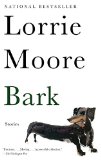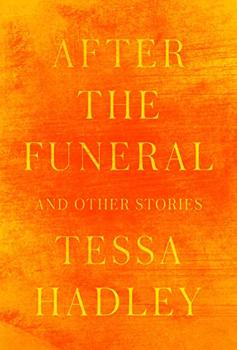Summary | Excerpt | Reading Guide | Reviews | Beyond the book | Read-Alikes | Genres & Themes | Author Bio

Critics' Opinion:
Readers' Opinion:
First Published:
Feb 2014, 208 pages
Paperback:
Oct 2014, 208 pages
 Book Reviewed by:
Book Reviewed by:
Sharry Wright
Buy This Book
In these eight stories, Lorrie Moore explores the emotional fallout of divorce with biting humor and the deep ache of sadness. The end of love. The book's title, Bark, shows up in several of the stories with various meanings—the bark of a man's voice; someone barking up the wrong tree; the denial that a dog's bark could be worse than its bite. I saw Bark as a metaphor; the tough outer layer that a tree grows to protect what is tender, soft and vulnerable inside is not unlike our own defenses—the lashing out, cynicism and sharp tongues we sometimes use to protect ourselves.
In "Debarking," Ira, a newly divorced man—bitter, terrified and depressed—ventures into the awkward and deflating arena of middle-aged dating only to find his date (a life-weary, hashish-smoking, pediatrician) equally bitter even eleven years after her own divorce. She is more interested in spending time with her overly attached, sullen teenage son than with him. Sitting together in a restaurant Ira looks around, silently and cynically comparing the accoutrements to love: "The walls, like love, were Trompe L'Oeil—walls painted as viewful windows, though only a fool wouldn't know they were walls. The menu, like love, was full of delicate, gruesome things—cheeks, tongues, thymus glands. The candle, like love, flickered—in the brass tops of the sugar bowl and salt and pepper shakers."
In "Wings," K. C. and Dench, a thirty-something couple, look for a way to survive after the indie band they were members of, doesn't make it. "Her lyrics weren't sly or hip or smoky and tough but the demure hopes of a mouse…Audiences booed…" K.C. secretly wishes for Dench to sell drugs – she knows he expects her to find a way to pay the rent. K.C.'s disillusionment with her poorly chosen mate segues into her feelings of wasted youth and the sense that life has passed her by. "A life could rhyme with a life—it could be a jostling close call that one mistook for the thing itself."
In "Foes," a middle-aged couple attends a political fundraiser in Washington D.C. As they deride the guilt and weariness of the wealthy with a kind of quiet desperation, their cynicism exposes their own vulnerabilities and disappointments with themselves and with each other.
In each of the stories, emotionally bewildered characters question each other's sanity. For example, there's the wife who suspects her husband of either being a space alien or having a brain tumor. These characters' stinging observations of life make us cringe with recognition and laugh out loud at the absurdity of our own expectations of attachment and romantic love. Moore arms her damaged characters with shields – snappy and snarky comebacks to try and ward off the misery and disenchantment at finding that their lives, their hopes and dreams, have failed. And while each story is very personal, focusing on one or two characters, most are positioned against a backdrop of some current event —the bombing of Baghdad and war in Iraq, 9/11, the death of Michael Jackson – that tethers them to a broader sense of despair and disillusionment.
It is humor in both the crisp, honed language and depictions of the absurdity of life that keeps this collection of stories from being unbearably sad. There were times when I could sympathize with the hurt feelings and bitterness that Ira feels in the first story: "Observing others go through them, he used to admire midlife crises, the courage and shamelessness and existential daring of them, but after he'd watched his own wife, a respectable nursery school teacher, produce and star in a full-blown one of her own, he found the sufferers of such crises not only self-indulgent but greedy and demented, and he wished them all weird unnatural deaths with various contraptions easily found in garages." But I also agreed with the new divorcee who says, "I don't believe in fighting. I believe in giving peace a chance. I also believe in internal bleeding."
The stories sport no happy endings to speak of, although the fact that characters can suffer so much and survive with a sense of humor is a lot more reassuring than it might seem. But the real hope lies in the truth of the negative—that the loss of love makes us so miserable, is a reminder that it is love that makes us happy, gives us joy, makes us whole.
I would recommend Bark to anyone who enjoys contemporary short stories that plumb the depths of human emotion while giving the reader breathing space to laugh out loud and cope with the ride.
![]() This review was originally published in The BookBrowse Review in March 2014, and has been updated for the
November 2014 edition.
Click here to go to this issue.
This review was originally published in The BookBrowse Review in March 2014, and has been updated for the
November 2014 edition.
Click here to go to this issue.

If you liked Bark, try these:

After the Funeral and Other Stories
by Tessa Hadley
Published 2024
A masterful collection of stories that plumb the depths of everyday life to reveal the shifting tides and hidden undercurrents of ordinary relationships.

by Edna O'Brien
Published 2017
Collected here for the first time are stories spanning five decades of writing by the "short story master." (Harold Bloom)





The Funeral Cryer by Wenyan Lu
Debut novelist Wenyan Lu brings us this witty yet profound story about one woman's midlife reawakening in contemporary rural China.
Your guide toexceptional books
BookBrowse seeks out and recommends the best in contemporary fiction and nonfiction—books that not only engage and entertain but also deepen our understanding of ourselves and the world around us.